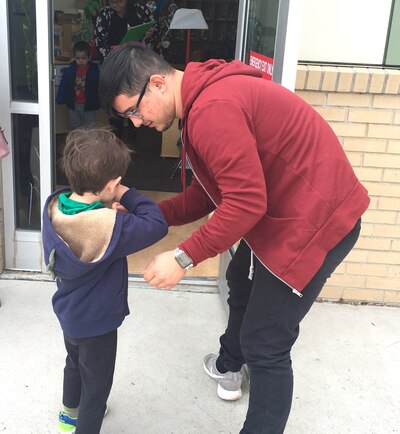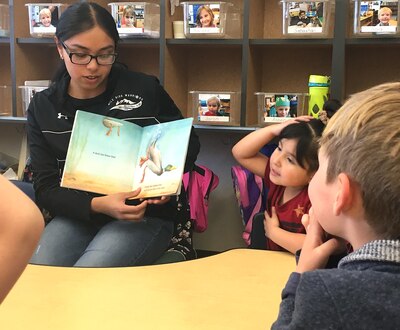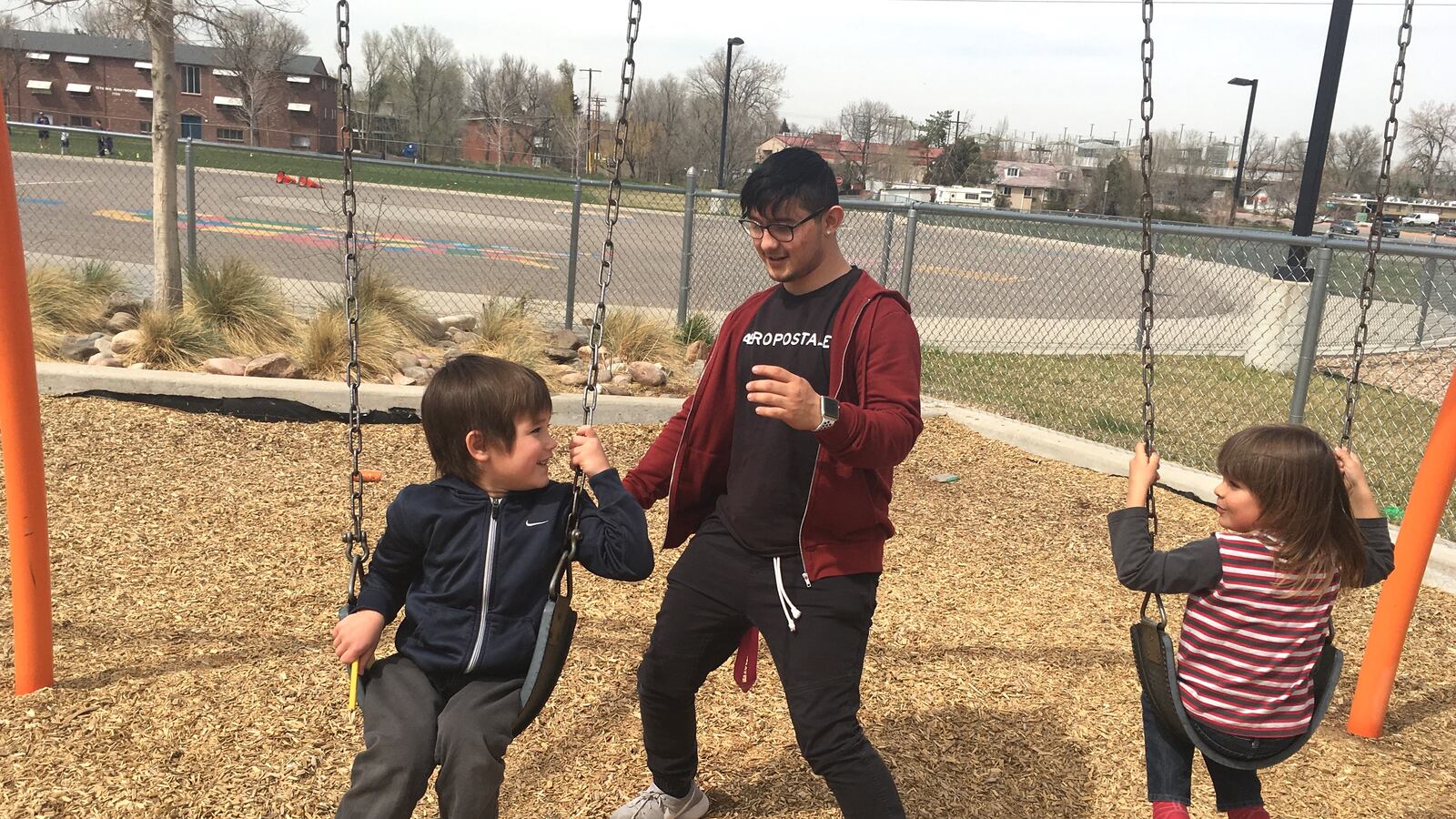Julian Salazar pushed preschoolers on swings, weaving deftly between them as the children careened back and forth. Earlier in the afternoon, the 18-year-old had worked mazes, played a number-themed card game, and snacked on Goldfish crackers with the 3- and 4-year-olds.
It was all part of Salazar’s weekly internship in a preschool classroom a couple miles away from his high school, Jefferson Junior/Senior High in the Denver suburb of Edgewater.
The internship, which ended in early May, is one component of a new early childhood career pathway offered at the high school. The year-long program also includes two early childhood classes and leads to an entry-level certificate from Red Rocks Community College that qualifies students to be assistant preschool or child care teachers.
Salazar — and students in similar concurrent enrollment programs around Colorado — represents one segment of the child care field’s next generation. With their professional lives just beginning, the students are laying the foundation to earn further credentials and become the lead preschool teachers and directors of the future. It’s a vision straight out of the state’s three-year plan to build a strong early childhood workforce. But in a field known for low pay and high turnover, keeping these students in the pipeline is no small task.

Still, organizers of the Jeffco school district’s early childhood pathway are optimistic. Enrollment in the program at Jefferson is set to more than double from 19 this year to 43 next year, and plans are in the works to expand to two other district high schools — McLain Community and Arvada West — by 2020.
The district offered similar early childhood training programs at certain district high schools in the past, but they fizzled out. One had targeted teen moms enrolled at McLain, for example, but many of the students weren’t ready for college-level work, said Janiece Kneppe Walter, who leads the early childhood education program at Red Rocks and helped the district set up the pathway program.
A few years ago, Kneppe Walter and her colleagues won a grant to revamp the two introductory early childhood classes. Then in the fall of 2016, teacher Nicole Kamman launched the pathway program at Jefferson with eight students. At first, it was just a sequence of two college courses modified for a high school audience. This year, leaders decided to add the 22-hour internship to give students more hands-on practice.
While Jefferson is one of the lower performing high schools in the district, it has posted improved graduation rates and test scores in recent years. The vast majority of its students are eligible for free or reduced-price school meals, a proxy for poverty.
Kamman sees the early childhood program as a way to give these students valuable experience in a field where qualified workers are in high demand.
“Any opportunity to get them career-ready … I knew I had capacity to promote that,” she said.
At the same time, local preschoolers in Edgewater and nearby areas get the chance to see teenage role models from their own communities, many of whom speak Spanish, as they do.
On a spring day in Kamman’s classroom, her high school students discussed nine child temperament traits and then acted them out as classmates tried to guess the characteristic.
When it was Salazar’s turn, he mimed sweeping the floor, not giving up even after repeatedly fumbling with the broom and dustpan.
“Persistence,” a classmate guessed correctly.
Of the eight Jefferson students who completed the early childhood pathway program last year, four landed jobs at local preschools or child care centers, Kamman said, and a fifth enrolled at Red Rocks seeking a degree in early childhood education.
But for some students, perhaps even a majority, the pathway program is a stepping-stone to something else.
“I don’t think they necessarily see early childhood as their endpoint,” Kamman said.
One of her students hopes to become a pediatrician, so the early childhood classes are a useful stop in a longer journey.
Salazar, a self-assured teen who was as comfortable helping kids with stubborn jacket zippers as playing chase on the playground, described his internship in the preschool classroom at Jefferson County Open School as “amazing.” Asked if he planned to pursue early childhood education, he said he could see working as a teaching assistant for a short time, but not necessarily long-term.
“I’m looking more or less for a ‘now’ thing,” he said.
Another student in the pathway program, senior Sonya Hernandez, felt the same way. She plans to study event management at Metro State University next year, but enrolled in the pathway program to improve her short-term job prospects.
“For me, it was more so about having the opportunity to get a better job after high school rather than working a regular minimum wage job at a fast food place or retail,” the 17-year-old said. “I figured I might as well do it and also get the college credits.”
Kamman said the field’s wages are a bit higher than minimum wage and therefore competitive for teenagers just starting out. Nationwide, the median wage of early childhood workers is $10.60 an hour, according to a 2016 report from the U.S. Department of Education. Colorado’s minimum wage is $10.20 this year and will rise to $11.10 in 2019.
The shortage of early childhood workers is a perennial problem in the state. A recent survey of Colorado child care providers found an average annual turnover rate of 16 percent for lead teachers and 22 percent for assistant teachers. In addition, 70 percent of directors reported difficulty in finding teachers for vacant positions.
Early childhood pathway programs like the one at Jefferson Jr./Sr. High represent only a partial solution to the early education workforce crunch. But to Kneppe Walter, that’s OK. If some pathway students use early childhood jobs to work their way through college in unrelated majors, she doesn’t see that as problem.
“They’re still walking away with some great life skills,” she said. “If they could contribute for two to five years, I’d be tickled pink.”

Ariadna Santos, a soft-spoken high school junior who also interned at Jefferson County Open School, may well fit this profile.
The 16-year-old, who said she has no younger siblings and has never worked as a babysitter, said the internship made her more comfortable with young children. On a recent day, she sat at a knee-high table and read a picture book about animals to a half-dozen preschoolers. As one little boy repeatedly touched his neighbor’s arms and shoulders, she calmly said, “Let’s not grab other people. Keep your hands to yourself.”
It was the kind of episode Santos found daunting at the beginning. Early in the internship when two children got in a sandbox fight, she had no idea what to do and the lead teacher had to intervene.
“Nowadays, it’s just easier to calm them down and get them to work with each other,” said Santos, whose other career interests include architecture and interior design.
“I don’t really know what I want to do as a career yet so I just really wanted to take this class as an opportunity to see what one of the options could be,” she said.
Even if Santos doesn’t stay in the early childhood workforce permanently, Kneppe Walter is hopeful that the pathway experience will be formative for others in the program.
“What’s lovely about early childhood is it’s got this strong core of social justice to it,” she said. “If students resonate with that idea, ‘I want to be empowered. I want to make a difference,’ then it’s not such a hard sell to go into early childhood.”

